If your cat has just given birth and you’ve noticed that there doesn’t seem to be enough milk for each and every kitten, you might have to feed them with cat milk replacement.
A cat milk replacement needs to have protein and fat, but it should also contain vitamins, minerals, and amino acids for a healthy start in life, below are 5 of the best that we recommend:
Contents
1. PetAg KMR Kitten Milk Replacer Powder
It really shouldn’t come as a surprise that this is our top choice in terms of kitten milk replacers.
This product has been used by hundreds and hundreds of cat parents across the world and with excellent results each time.
The powder contains minerals, vitamins, taurine, as well as prebiotics and probiotics, which all help your cat develop into a healthy and strong adult.
For the best results and as per the instructions provided by the manufacturing company, you should mix one part KMR milk into two parts warm water and then feed it to your cat.
This kitten milk replacer can be used for cats that are younger than six weeks, but it can also be administered to adult ill cats or seniors.
- Form: Powder
- Allergen-free: Yes
- Weight: 181g
- Feeding instructions: 30ml/4 oz (115g) body weight per day
Pros:
- Very easy to use
- The reconstituted milk can be kept refrigerated and fed later
- Easy to digest
Cons:
- It can be expensive if you have several kittens to feed
2. Beaphar Lactol, Substitution Maternity Milk for Kittens
Lactol can be used for kittens whose age is younger than 35 days, but there aren’t any specific restrictions in this sense, which means that you can also use it for adult and senior cats who have a hard time feeding due to dental health problems, for example.
The milk can also be given to pregnant cats as a supplement since it contains a variety of vitamins ranging from B2 and B12 to A, C, and B6.
It is also rich in minerals, which, as you probably know, can be essential for the development of a healthy musculoskeletal system, especially in early life.
Similar to other products that we are showcasing in our selection, this one comes in the form of a powder that has to be mixed with warm water.
- Form: Powder
- Allergen-free: Yes
- Weight: 250g
- Feeding instructions: add 30g (2 scoops) to 105ml warm water and feed daily
Pros:
- The container is larger, so it will last for longer
- Besides vitamins and minerals, it contains antioxidants and taurine, as well as methionine
- Highly digestible for all kittens
Cons:
- Some adult cats might not like the taste
3. Royal Canin BabyCat Milk
Royal Canin is one of the leading brands in the industry of making food for cats and dogs alike, and they use some of the best ingredients currently available.
This particular formula is made to be a substitute for the nutrition that a kitten would normally benefit from if her mother were to feed her.
While the Royal Canin BabyCat is definitely worth considering as the number of animals that clearly refuse it or aren’t interested in it is very low, its composition could be improved.
It is one of the few products that you will find on this list to contain whey protein, which, as you know, is derived from dairy milk.
For this reason, some kittens might experience mild digestive distress in the form of loose stools right after you start feeding them the product.
Other than that, the ingredients are excellent as this option contains both minerals and vitamins and taurine, which is essential for kittens to remain healthy.
- Form: Powder
- Allergen-free: Yes
- Weight: 300g
- Feeding instructions: Add 10ml of the product to 20ml warm low-mineral bottled water. Mix thoroughly to ensure that all clumps dissolve.
Pros:
- It comes in a slightly bigger size
- It contains plenty of important nutrients
- Has fish oil (for a healthy central nervous system development)
Cons:
- The formula might have been even better without the whey protein
4. Whiskas Cat Milk Mix Pack
This is a pack of several bottles of milk, two packets of milky treats, and a toy. The toy can vary from one box to the next, so you really can’t know which one you are going to be delivered.
As for nutrition, there’s really nothing to complain about in this sense as the milk replacer contains a whole range of physiological additives such as vitamin D3, vitamin E, as well as biotin and taurine, an amino acid that can be quite important to cats.
One thing we do have to add with regard to this product is that it does contain 14% skimmed milk from skimmed milk powder, so it does contain some dairy.
For this reason, we recommend giving it to cats and kittens that have no recent history of digestive distress.
- Form: Liquid
- Allergen-free: Yes
- Weight: 1.52 kg
- Feeding instructions: Each bottle contains up to four servings. Reduce or increase the meal size according to your kitten’s weight and age. After opening each bottle, keep it refrigerated and use it within four days.
Pros:
- Eight bottles should last you for a week or even more when weaning the kitten
- It also contains minerals besides vitamins (calcium and phosphorus)
- Decent caloric value (48 kcal/100g)
Cons:
- The supplied toy can vary in design, so you can’t know what to expect or if your cat will like it
5. Delamere Dairy Toplife Cat Milk
Even though this milk replacement is made from cows’ milk, so we can’t say it’s the best option out there on the market, it is made from reduced lactose dairy milk.
This was done specifically to minimise the risk of your cat or kitten suffering from any digestive complications such as vomiting and diarrhoea, which could occur if you otherwise give her normal milk.
The formula contains taurine and minerals besides the reduced lactose milk itself.
It also contains 120g/100ml of calcium and up to .02% in taurine. It can be kept refrigerated after you open the bottle, but you should try and use it within three days.
- Form: Liquid
- Allergen-free: Yes
- Weight: 200ml per bottle, 18 bottles per pack
- Feeding instructions: Since this variety can be given to adults and kittens alike and it’s slightly less rich in vitamins, minerals, and protein, we suggest giving kittens enough until they feel full.
Pros:
- It doesn’t have to be mixed with water — it can be fed as is
- Highly digestible milk for adults, seniors, and young cats
- It contains taurine, an important amino acid for this species
Cons:
- The formula would have been better had it been made from goats’ milk instead of cows’ milk
What makes a good kitten milk replacement?
When it comes to any cat milk replacer that you might buy today, if it is clearly marketed as such, you don’t have to worry about it having too much protein, fat, or even carbohydrates.
Granted, some can be made with reduced cows’ milk, which makes them less digestible compared to other types.
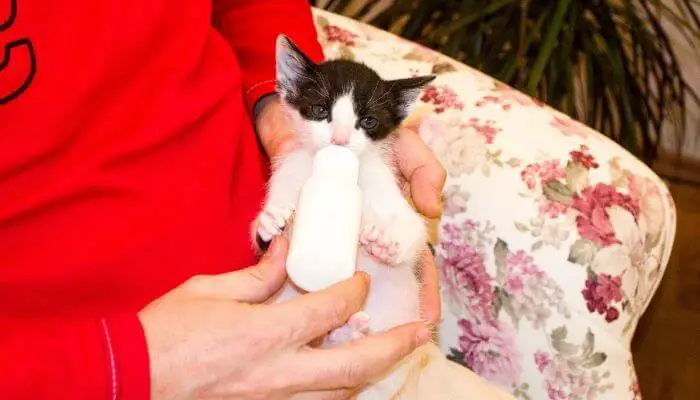
We’d say that these work best with slightly older kittens that are on the point of being weaned.
In any case, some of the most important factors to consider when deciding between products are the following:
Amino acids
Taurine is by far one of the most important amino acids that all cats need, regardless of their age.
Try to look for a milk replacer that comes with taurine, as it is essential for healthy development. It definitely wouldn’t hurt if the variety you picked also contained a bit of linoleic acid, as it has been shown to help a kitten grow a healthy coat.
Vitamins and minerals
A kitten normally gets these nutrients from her mother’s milk, so the product that you buy needs to contain several vitamins, such as the B complex, vitamin A, E, C, and D3.
Calcium, magnesium, and phosphorus are also essential in helping the animal’s musculoskeletal system to develop properly.
Although cases of rickets are more uncommon in this species as they are in some dogs, cats can get it in the lack of appropriate nutrition.
Protein and fats
As you probably know, cats are obligate carnivores, which means that most of their diets should be composed of protein and fat.
A cat mother’s milk contains these two nutrients.
Unfortunately, since it is hard to tell just how much protein you should give a newborn kitten, just make sure you stick to the feeding recommendations specified on each product’s label.
Probiotics
In their early life, cats tend to develop digestive health issues a lot more than they do after growing into a healthy adult.
Ideally, the milk replacement you will buy needs to contain both probiotics and prebiotics as they can nourish and supplement the intestinal flora that’s inside the kitten’s digestive tract.
Form
If you have looked for a cat milk replacement before, you’ve probably come across two types: one that looks like baby formula, meaning it needs to be mixed with warm water in order to get it turned into ‘milk’ and another that comes in a liquid form, meaning it can be fed to kittens as is.
The one you choose purely depends on convenience and personal preferences.
However, we couldn’t help noticing that milk powders are often more rich in nutrients compared to their liquid counterparts, so we advise that you look at the label before making up your mind.
Who should purchase cat milk replacements?
Milk replacements prove their worth for three specific cat categories:
- Orphaned kittens
- Underdeveloped kittens that do not manage to eat enough milk from their mothers
- Geriatric cats or those that are ill
Kittens that have lost their mothers need to be fostered and cared for by humans as if they were the mother cat.
In some cases, the mother’s mammary glands might not be able to secrete enough milk for the entire litter, so the likelihood of one kitten being underdeveloped is quite high.
This could happen for a number of reasons – if the cat had a cesarean section performed, she might not have the same hormonal flux as those that have given birth naturally.
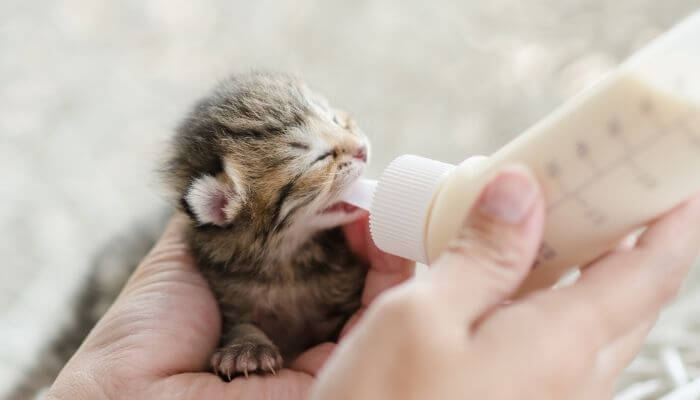
Other cats might simply lack the maternal instinct and could abandon or not care for their litter properly.
Finally, an instance where cat milk can be quite useful is in seniors, whose teeth might make them unable to eat kibble or any other type of solid food or who might be recovering from disease or surgery, in which case they’d have to be fed a liquid diet (as solids in the digestive tract can put pressure on the sutures inside the cat’s body).
Some cats can have calicivirus, which can be a chronic health issue.
Although some manage to live for several years after being diagnosed, they often develop oral health issues.
They will as a result refuse to eat anything but liquid food — making cat milk a good replacement for their diet.
How much kitten milk replacer can you give to kittens?
The best answer to this question is simple – as much as the manufacturer or your vet recommends you to.
Every formula is different and could contain unique amounts of protein, fat, and vitamins and minerals.
If you are caring for an orphaned kitten, you will have to feed her quite often — sometimes every two to three hours, depending on her age.
It takes up to six or seven weeks for kittens to be weaned and get them interested in any other type of food besides the milk replacer.
Final thoughts
Most cats are lactose-intolerant, and for this reason, they should not be fed dairy products.
The only time in a cat’s life when lactose intolerance is less of an issue is when they are very young.
While goats’ milk might be an option as it is easier to digest, milk replacers can make the task of feeding an orphaned kitten or an ill cat much less complicated.
Cat milk formulas contain all of the right ingredients for healthy development from the age of 0 weeks to 6 weeks and beyond.
As an Amazon Associate I may earn a small fee from qualifying purchases at no extra cost to you. This helps us run the site, so thanks for your support!

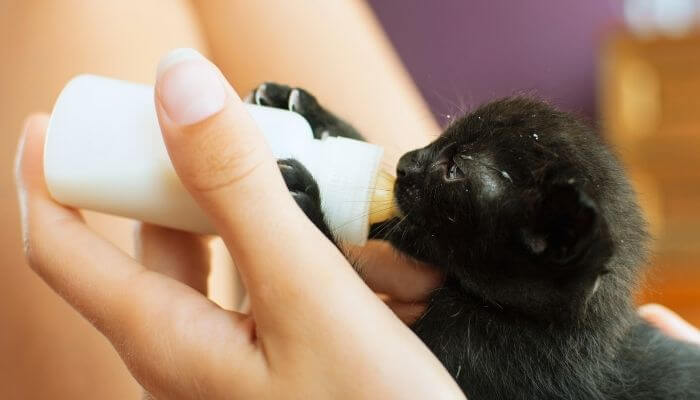



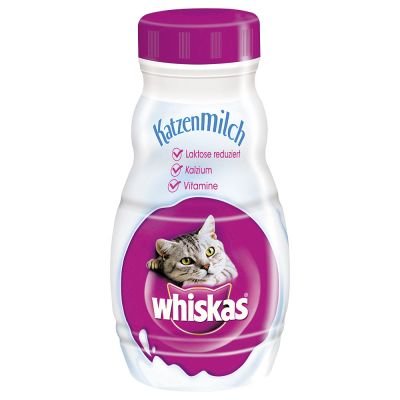

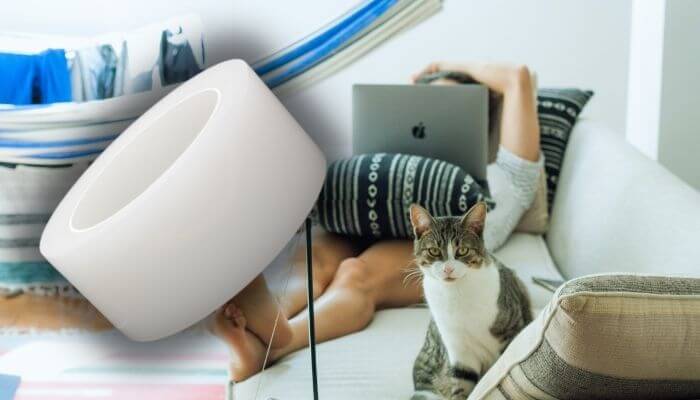
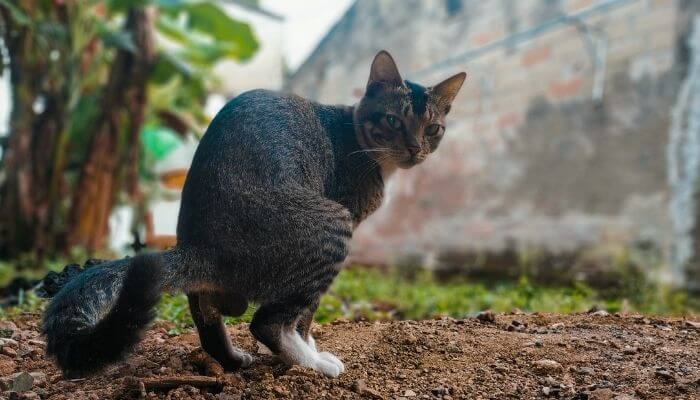
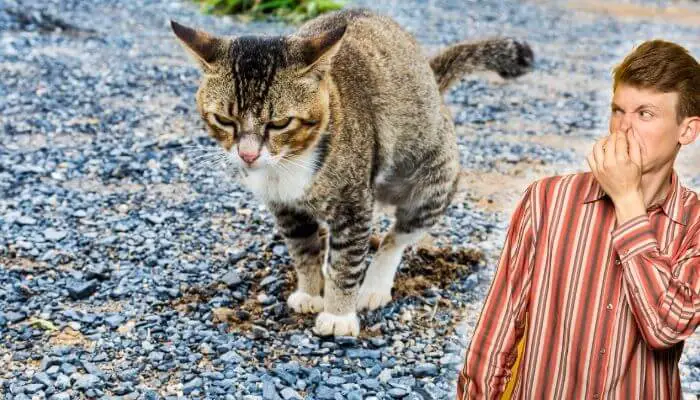
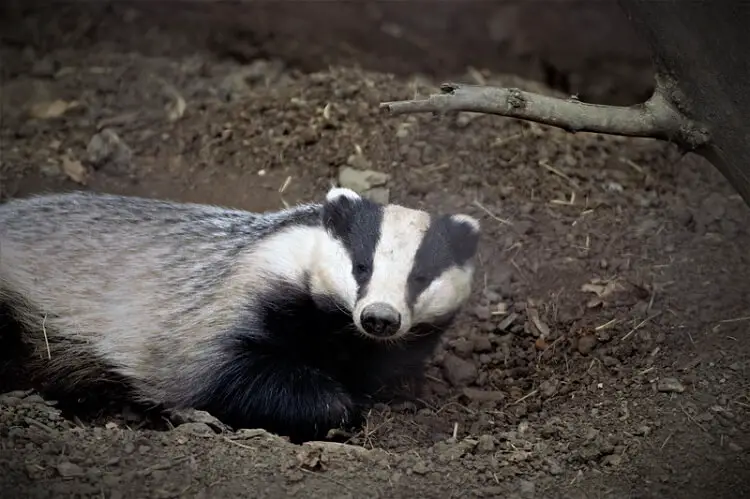
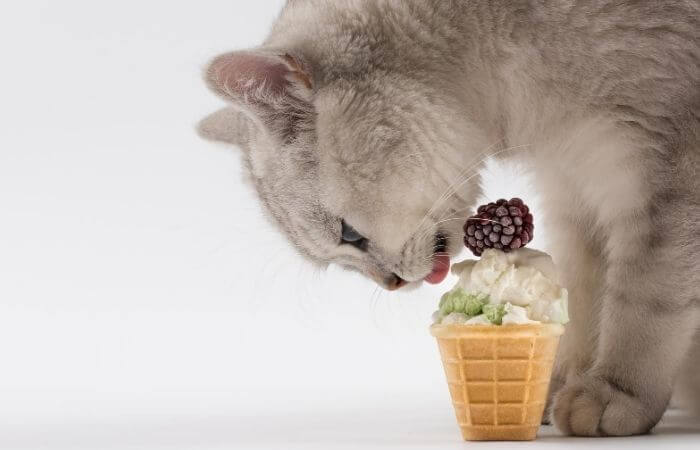

Leave a Comment